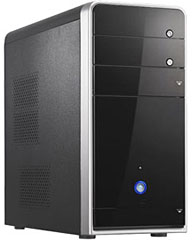Zis Mac
Alan Zisman on the Mac
Open Computer: The First Macintosh Clone in a Decade
- 2008.04.16 - Tip Jar
Follow Alan Zisman on Twitter.
In the news this week: a small Florida-based company, Psystar offered customers what it promised were Mac OS X compatible PC clones for $399. For about half the price of a low-end Mac mini, Psystar's Open Computer offered a faster and bigger hard drive, a more powerful dedicated graphics card, and expandability in a generic PC clone tower case.
No operating system for that price, though. Psystar noted:
"With the EFI V8 emulator it is possible to install Leopard's kernel straight from the DVD that you purchased at the Apple Store barring the addition of a few drivers to ensure that everything boots and runs smoothly,"
The company also offered copies of Leopard for $150, and if you bought it from them, they would install it.
 What's the catch? Ever since
Apple canceled its clone licensing
program in the late 1990s, the various versions of the Mac
operating system have included a clause that customers could only run
it on Apple-branded hardware.
What's the catch? Ever since
Apple canceled its clone licensing
program in the late 1990s, the various versions of the Mac
operating system have included a clause that customers could only run
it on Apple-branded hardware.
By the afternoon of April 14th, the company's Open Computer webpage was no longer responding. Perhaps it was overwhelmed by the response after the news got out, but I wouldn't be surprised if they'd heard from Apple's lawyers.
A little Mac-history:
In 1994 (in the era of System 7.x), Apple announced that it would allow non-Apple computer manufacturers to license the then-current Mac operating system. The company's hope was that these other companies would help grow the market for Mac OS-powered systems in market niches where Apple was not reaching out.
Several companies, including Umax, Motorola, and others paid Apple's licensing fees. By 1996, they accounted for about 10% of all Macs sold worldwide. In that same year, however, Apple's sales were some 30% lower than the year before.
While Apple's hope had been that the clones would bring the joy of Mac to new markets, apparently the bulk of the clone sales were to people replacing an older Mac - in other words, Apple's core customer base. With Mac-compatible systems that were either cheaper or more powerful than official Apple models, that should have been no surprise. (In this era, I owned a Motorola StarMax, built around a 160 MHz PowerPC 603e CPU. It used PC-style VGA displays and a PS/2 mouse and keyboard but ran Mac OS 7.5.3 and all the Mac software I could throw at it just fine).
Upon Steve Jobs' 1997 return to Apple, he realized that this was a problem for the company; Apple was primarily a hardware company, and there was a lot more profit in selling a Mac than in getting what has been estimated as a $25 licensing fee when Motorola or Umax sold a Mac clone. One of his first acts as Apple CEO was to announce that the clone licenses were not going to be renewed past early 1998, and that even existing licensees weren't going to be allowed to offer new versions of the Mac OS starting with Mac OS 7.6.
Apple has ignored calls to make the Mac operating system available to other companies ever since.
It was harder to make a clone Mac back then; much of what made a Mac a Mac was hard-wired into the computer's ROM chips. More recently, though, this code was moved to software. And even more recently, Apple switched from using PowerPC CPUs to Intel chips - the same sort of CPUs found in most Windows PCs. In fact, today's Macs are arguably standard PCs in fancy cases - and they can even be set up to boot to Windows XP or Vista using Apple's Boot Camp installer.
Perhaps it is not surprising, then, that there's an underground "Hackintosh" movement devoted to the tricks needed to build a do-it-yourself PC that can boot to Mac OS X. I haven't done it, so please don't ask me for advice. As long as the movement remained do-it-yourself, Apple seemed to be leaving it alone. But in offering products for sale - and in getting a fair bit of media attention - Psystar apparently crossed a line.
Psystar's "Open Computer" does suggest that there is a market for a
lower-priced, expandable Mac - but will Apple listen.
![]()
Join us on Facebook, follow us on Twitter or Google+, or subscribe to our RSS news feed
Alan Zisman is Mac-using teacher and technology writer based in Vancouver, BC, Canada. Many of his articles are available on his website, www.zisman.ca. If you find Alan's articles helpful, please consider making a donation to his tip jar.
Today's Links
- Mac of the Day: 15" 'TiBook' PowerBook G4, (2001.01.09. A new 1" thin PowerBook design with a titanium case and 15" widescreen display.)
- Support Low End Mac
Recent Content
About LEM Support Usage Privacy Contact
Follow Low End Mac on Twitter
Join Low End Mac on Facebook
Favorite Sites
MacSurfer
Cult of Mac
Shrine of Apple
MacInTouch
MyAppleMenu
InfoMac
The Mac Observer
Accelerate Your Mac
RetroMacCast
The Vintage Mac Museum
Deal Brothers
DealMac
Mac2Sell
Mac Driver Museum
JAG's House
System 6 Heaven
System 7 Today
the pickle's Low-End Mac FAQ
Affiliates
Amazon.com
The iTunes Store
PC Connection Express
Macgo Blu-ray Player
Parallels Desktop for Mac
eBay

